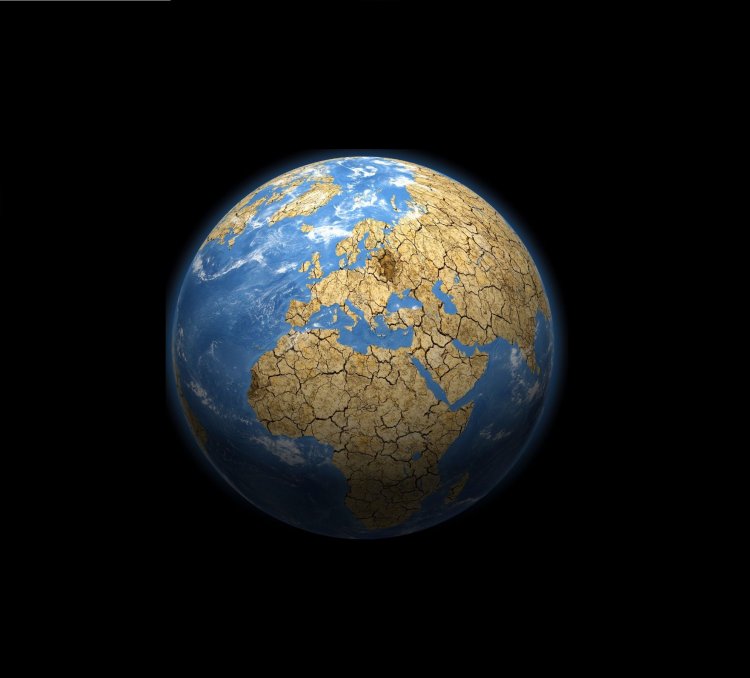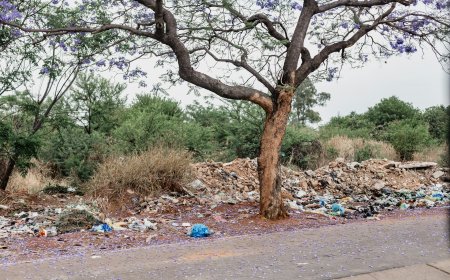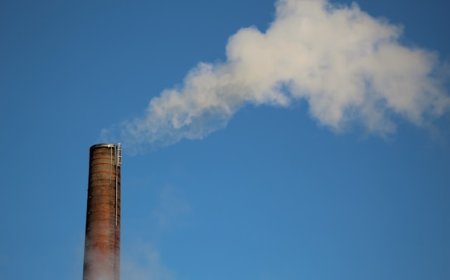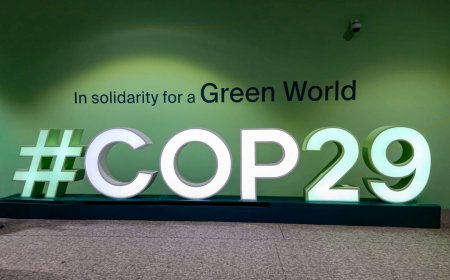In the run-up to the COP27, APRI, under the Climate Change Programs, is conducting expert interviews to address questions on climate action. This interview is with Prof. Chukwumerije Okereke. Professor Okereke is the Director of the Center for Climate Change and Development at Alex Ekwueme Federal University Ndufu-Alike and a Visiting Professor at the universities of Reading and Oxford, UK. He is also a Non-resident Senior Fellow with APRI, in the Climate Adaptation in West Africa project. In this interview, Prof. Okereke addresses issues of climate action in Africa in general and in Nigeria more specifically. He also provides recommendations for international policy makers and other stakeholders willing to work with African countries on climate action and to African policy makers on how to articulate Africa’s needs, priorities and opportunities around development and climate action.
The interview was conducted by Dr. Grace Mbungu, Senior Fellow and Head of the Climate Change Program at APRI. The responses have been edited for clarity.
Dr. Grace Mbungu: Based on your extensive experience on climate action and sustainable development in Nigeria, what are the sectors in most urgent need of climate action and why?
Prof. Chukwumerije Okereke: This is a good question because, while a broad view of the links between climate change and sustainable development is required, it is also very important to think in sector specific terms because, at the end of the day, this is where action will need to be targeted to address climate change and achieve sustainable economy development in Africa. From my experience of dealing with several African countries, I know that the sectors in most urgent need vary from country to country. A lot also depends on whether one is looking at impact and adaptation or at mitigation. However, with that said, there are still some sectors that tend to stand out in the literature and in interactions with policy makers. One of these is the agricultural sector. You see, only about 5% of agricultural activities in Africa are under irrigation. That means that about 95% is rain-fed agriculture. The consequence is that even moderate changes in climate can have a far-reaching impact on yield. This is more so important if you consider that, in many African countries, you have up to 75% of the population depending on subsistence agriculture for their livelihood. The other thing which often escapes the attention of many is that agriculture accounts for 20% to 45% of GDP in many African countries. So the combination of these things means that the climate impact of agriculture is one of the most serious ways through which climate change compromises the sustainable development of Africa.
The second sector that is critical is the energy or power sector. Africa is still a continent in darkness and climate change is making things worse. About 400 million Africans still cook with the traditional three-piece stove using animal dung, firewood, charcoal, farm and household waste as fuel. The average electrification rate in sub–Saharan African countries is about 45% and, in some countries, it is less than 25%. Climate change is worsening the energy situation in Africa in many ways. It is drying up water bodies, which in turn reduces the output for hydro-power and electricity generation. It is imposing excessively hot days, which require more energy for cooling. An effort to address climate change globally now also means that Africans are finding it challenging to mobilize resources to invest in traditional energy infrastructure.
Other major sectors include the water sector with increased amounts of rain and intensive flooding affecting millions of people per year, and their health, and causing a loss of biodiversity.
What should the COP27 focus on/add to the current discussion to avoid worsening the current climate impacts and socio- economic inequalities in Africa?
First, developed countries and especially the G20 countries must ratchet up their climate ambition. The IPCC has found that the current scale of climate ambition as communicated in the Nationally Determined Contributions (NDCs) is not sufficient to meet the Paris goal of 1.5 degrees. The greater the delay in closing the gap to this ambitious goal, the more the climate impact, which, as we all know, is mostly borne by poor countries especially in Africa; bear in mind that African countries make up to 80% of the Least Developed Countries.
The second thing is that COP27 needs to put a strong focus on adaptation. There is a need to increase the financial commitment going to adaptation. A few years ago, I encountered an analysis that suggested that 75% of climate change funding that goes to Africa is mitigation related, leaving adaptation finance at about 25%. Others have suggested that the adaptation finance gap in Africa is up to USD50 billion per year. African countries are already spending trillions of their own money in adapting to climate change they did not cause. It is a grave injustice that the West has imposed such a climate catastrophe on Africa and is now standing aloof and watching while Africa is suffering.
A third area of importance to Africa at COP27 is Loss and Damage. Climate change is already causing losses and damage of immense proportions in Africa and other parts of the world. We recently read that about 30 million people were affected in the unprecedented flooding event that hit Pakistan. While the tragedy in Pakistan has been a focus of mainstream media, hundreds of villages in Africa have been under water at various times of the year. COP27 needs to advance discussion on a special facility to address Loss and Damage.
Fourth, with so many people in Africa being displaced, I would expect an African COP to shine light on the links between climate, migration and conflict.
Lastly, I hope that African leaders will use the opportunity of an African COP to call for debt for climate swaps that will see African debts canceled in exchange for targeted climate action.
The energy crisis in Europe is being framed as an “opportunity for Africa''. What are the potential implications of this new interest in Africa’s energy resources (fossils and renewables) for achieving the Paris Agreement and the Sustainable Development Goals? And what does this shift in narrative/ priority mean for the global commitment to climate action?
I would not be very comfortable in framing the energy crisis in Europe as an opportunity for Africa. It is true that the crisis has caused some in Europe to turn towards Africa for new oil and gas deals. However, we need to realize that several decades of fossil fuel extraction in Africa has not necessarily resulted in prosperity for the continent. New gas deals that are focused on supplying and meeting the energy needs of Europe will be bad for Africa especially with the additional risk of stranded assets. In addition, using the excuse of the short-term crisis to push through all kinds of deals will also compromise the ability to meet the climate targets, which would mean greater climate impacts on Africa. It is therefore important that Africa takes a long-term and strategic view. Gas deals must have a provision for boosting local supply and for technologies that can capture carbon. In addition, it is also vital to continue a push for massive renewable investment as the long-term alternative.
There is a lot of talk around the Just Energy Transition Partnership (JETP) with South Africa that was announced at COP26. Do you see this as a potential model for other African countries’ climate action?
It could be. The problem is that it has not been fully worked out so it is too early for me to celebrate it as this golden key that will unlock investment for Africa. In my opinion, the JETP attracts more questions than answers. We do not know whether this is a good deal for South Africa from a financial, economic and social perspective; we do not know who is making the decisions – whether South Africa has all the powers to decide what it does or whether the money comes with several conditionalities. I have yet to know the impact of the implementation on the jobs of coal workers in South Africa, and the jury is still out in terms of JETP’s potential to induce step change in the South African low carbon development trajectory. I am also concerned that, if this model becomes the prevalent model displacing multilateralism at the UNFCCC level, then only resource-rich countries and those with capacity to negotiate deals will get the attention while smaller African countries that may be the most vulnerable to climate change will be ignored. So, while I am not at all opposed to the JETP, I think we need to be critical and cautiously optimistic.
What are your recommendations for international policy makers and other stakeholders interested and willing to work with African countries on climate action? What should their focus be?
We have covered a few grounds in response to some of the other questions. I would like to take this opportunity to highlight the huge lack of technical capacity in Africa and the need for international policy makers to pay a lot more attention to systematic and long-term capacity building in Africa. At the same time, there is a need for international organizations working in Africa to invest in building long-term collaborations that can truly help develop technical and policy expertise in Africa. It is a shame that, after several decades of international development co-operation, a lot of the key work in Africa is still done by fly-in-at-night foreign consultants, many of whom have very limited understanding of the local context needed for the work to be impactful and sustainable. The need for human, organizational and institutional capacity building in Africa is enormous and of urgent priority. Last year I started a project to build the capacity of Nigerian scholars to develop long-term energy and climate models, thanks to funding from the French Development Agency under the 2050 Pathways Facility. Before then, it was hard to find anyone in the country with a knowledge of integrated climate modeling. I am sure you know that a vast majority of the African NDCs were done by foreign climate modelers who performed their magic, as it were, in Europe and then went down to Africa to hand them a set of numbers and targets. This type of knowledge colonialism must stop.
What are your recommendations for Africa policy makers on how to articulate Africa’s needs, priorities and opportunities around development and climate action in the upcoming COP27 and beyond?
They must think strategically, and they must think long term. The climate induced global transition is well underway, and the focus must be how they can leverage climate action to pursue long-term sustainable development. African leaders must also get better at using the best minds in Africa rather than continuing to rely on knowledge from colonial institutions like the IMF and World Bank.
About the Author
Prof. Chukwumerije Okereke
Prof. Chukwumerije Okereke is a Non-resident Senior Fellow at APRI, the Director of the Centre for Climate Change and Development at Alex Ekwueme Federal University Ndufu-Alike and a Visiting Professor at the universities of Reading and Oxford, UK. He is a globally recognized scholar on global climate governance and international development with expertise in climate justice, national green growth transition in Africa, climate adaptation and business climate strategies. Over the last 20 years, Professor Okereke has maintained an extensive high-impact engagement with national governments, businesses and NGOs in Africa and led several high-profile international projects on climate change policy, mainstreaming and green economy transition in Africa, including the UNDP funded Africa Adaptation Initiative (AAI) commissioned by the Committee of African Heads of State on Climate Change (CAHOSCC), the Analysis of the Adaptation Components in Africa’s Nationally Determined Contribution (NDCs) commissioned by the African Development Bank and the Rwandan Green Growth and Climate Resilience Project, which was the first-ever national low-carbon plan in Africa.




